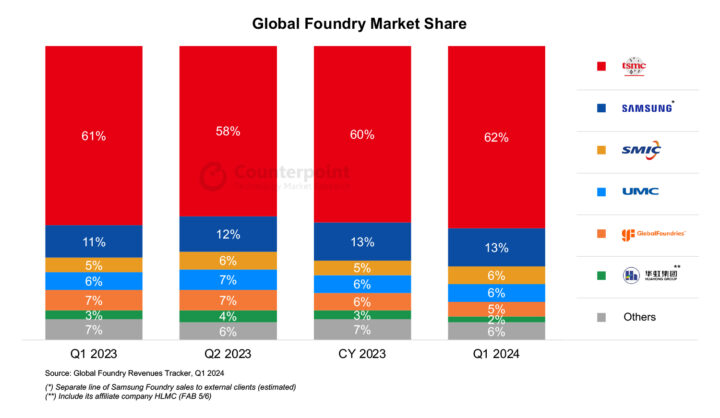Samsung Foundry was the world’s second-biggest semiconductor chip manufacturer in Q1 2024, but it is still nowhere close to its primary rival, TSMC. The company may have grand plans to defeat its Taiwanese rival, but those plans haven’t translated into a meaningful upgrade in its business yet.
Samsung was the world’s second-biggest chip maker in Q1 2024
According to the latest figures from Counterpoint Research, Samsung Foundry was the world’s second-biggest pure-play foundry (semiconductor chip manufacturer) firm in Q1 2024. The company had a 13% market share, two percentage points higher than Q1 2023. That’s an improvement, but not even close enough to be considered an improvement.
The South Korean firm has consistently lost big-name chip clients, including Apple, Nvidia, and Qualcomm, to TSMC due to efficiency-related issues. With its 2nm and 3nm process nodes, the company hopes to pull back some of its previous clients from its Taiwanese rival.

Taiwan Semiconductor Manufacturing Company (TSMC) has been the world’s biggest contract chip manufacturer for years. Its market share was 62% in the first quarter of this year, a one-percentage-point improvement from Q1 2023. All the prominent chip companies globally, including AMD, Apple, Intel, MediaTek, Nvidia, and Qualcomm, use TSMC to make all or some of their chips.
SMIC captured a 6% market share and was ranked third. UMC had a 6% market share, while Global Foundries had a 5% market share during Q1 2024. A couple of years ago, Intel spun off its foundry division as a separate company, and it is expected to become a headache for Samsung Foundry in the coming years.
You can watch our video below to see how 4nm chips made by Samsung Foundry (Exynos 2400) and TSMC (Snapdragon 8 Gen 3) compare in terms of performance and power efficiency.
Samsung Foundry has been investing heavily in improving its chip manufacturing processes. It has a grand plan to invest up to $115 billion to become the world’s biggest chip manufacturer by the year 2030, and those plans include building advanced chip-making plants in the US. One such plant is already being constructed.


